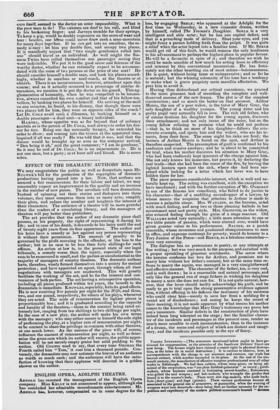EFFECT OF THE DRAMATIC AUTHORS' BILL.
WE may congratulate the public as well as dramatists upon Mr. BULIVER'S bill for the protection of the copyrights of dramatic productions having passed into a law. Now, that authors are secured a fair remuneration for their labour and talent, we may reasonably expect an improvement in the quality and an increase in the number of new pieces. The novelists will turn dramatists. Instead of spinning out their stories and dialogues into three volumes, they must compress them into as many acts; simplify their plots, and reduce the number and heighten the interest of their characters. The audience of a theatre will be more grateful than the readers of a circulating library, and the managers of theatres will pay better than publishers.
The act provides that the author of any dramatic piece shall possess, as his property, the right of representing it during his life; and in case of his death, it descends to his heirs until the end of twenty-eight years from its first appearance. The author and his heirs have a remedy at law against any person representing it without their permission. The amount of penalty to be governed by the profit accruing to the offender, or the loss to the author; but in no case to be less than forty shillings for each offence. An action at law is, in the present state of our legal tribunals, a remedy worse than the injury, especially when the sum to be receovered is small, and the parties so unsubstantial as the majority of managers of country theatres. The dramatic authors have, therefore, wisely formed themselves into a society for mutual protection ; and have appointed an agent, through whom all their negotiations with managers are conducted. This will greatly facilitate the working of the act, and be for the interest and con- venience of both parties. The actbaving a retrospective operation, including all pieces produced within ten years, the benefit to the dramatists is immediate. KNowLss, especially, feels its good effects. He is now receiving five pounds per night for the Wife, and three, two, and one pound, respectively, for others of his plays, whenever they are acted. The scale of remuneration for lighter pieces is proportionably less ; and it is graduated according to the capacity and locality of the theatres,—those in the country being rated ex- tremely low, ranging from ten shillings to two shillings per night. In the case of a new play, the author will make his own terms with the manager; who may either secure to himself the sole right of performing the play, at a higher rate of remuneration per night, or be content to share the privilege in common with other theatres, at one much lower. As the success of the piece will, of course, influence the amount of remuneration per night, as well as deter- mine the gross sum which its author will receive, the public appro- bation will be not merely empty praise but solid pudding to the author. Old Courrs used to say, that every time GEORGE the Fourth called him " Tom," it cost him a thousand pounds. Con- versely, the dramatists may now estimate the bravos of an audience as worth so much each; and the audiences will have the satis- faction of knowing that their applause will descend in a golden shower on the author.




















 Previous page
Previous page